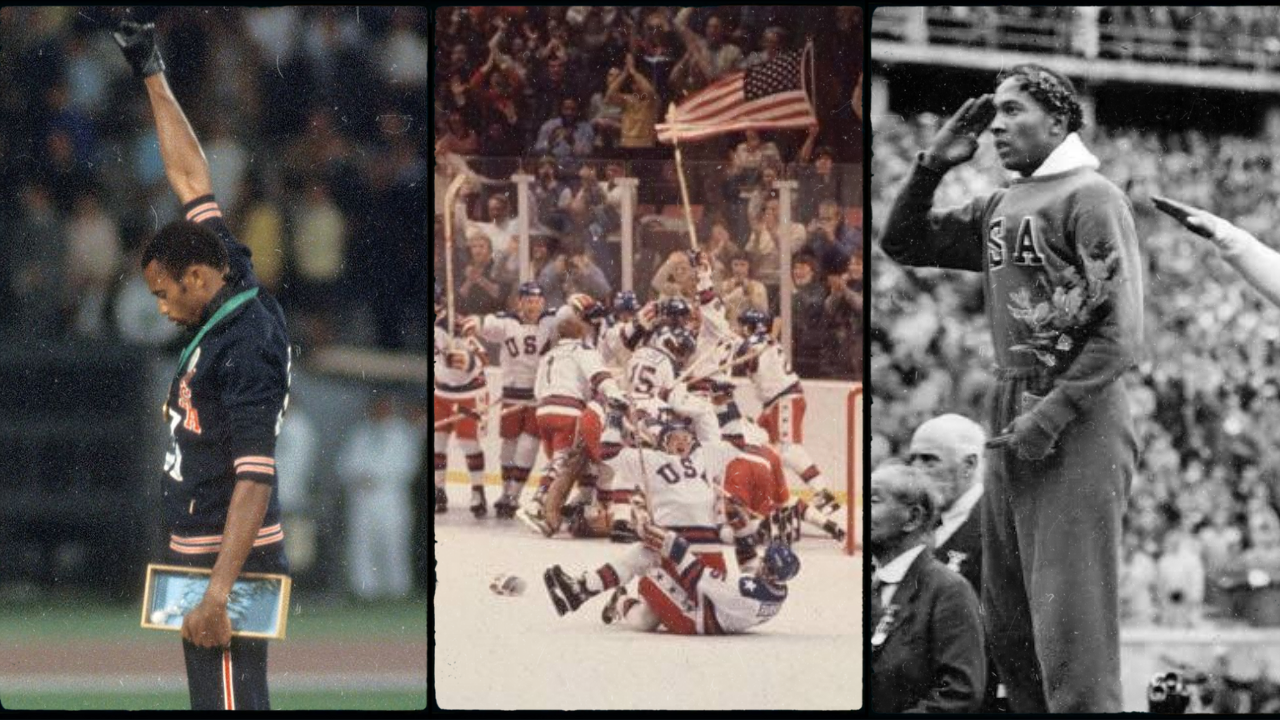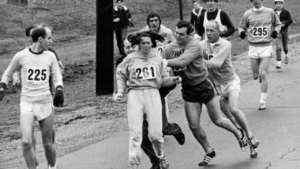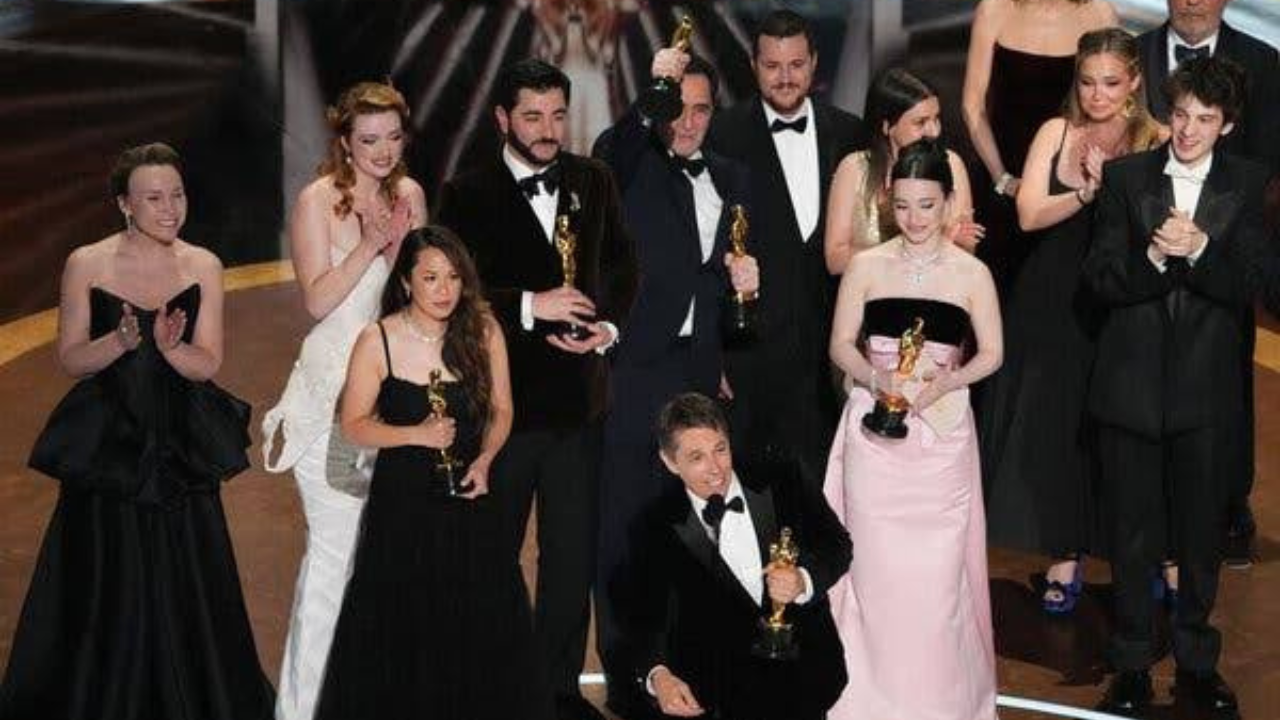Events
Revisiting some of the Most Iconic Moments in the History of the Olympics!

There were many moments in the Paris Olympics that truly embodied the spirit of sportsmanship, reminding us that the Games go beyond just competition. We’re taking a look back at the most iconic moments in Olympic history that prove the Games are much more than just sports.
This year, as we celebrated the Olympic Games, we witnessed numerous moments where records were shattered, and the true spirit of camaraderie and sportsmanship shone brightly. This wasn’t just a coincidence as it reflects the very principles that the Olympic Games stand for. The Olympics are celebrated as a global sporting event that promotes unity, peace, and excellence through athletics. While the origins of the Olympics date back to ancient Greece, where they were held in Olympia as a religious festival in honor of Zeus, the king of the Greek gods, the modern Olympic Games, revived in 1896 by Baron Pierre de Coubertin, aim to bring together athletes from around the world to compete in different sporting events, supporting international goodwill, cultural exchange, and the spirit of fair play. There have been many instances in history where Olympics are not just about competition but they also symbolize the shared human aspiration for peace, understanding, and mutual respect among nations.
Here are some historic Olympic moments that we look back at with admiration and pride:
Tommie Smith and John Carlos’ Defiant Stand at the 1968 Mexico City Games

During the medal ceremony for the men’s 200-meter race, American athletes Tommie Smith and John Carlos took a courageous stand against racial injustice. As they stood on the podium to receive their gold and bronze medals, respectively, they raised their gloved fists in a Black Power salute, a gesture that became one of the most iconic images in Olympic history. With their heads bowed and shoeless feet, symbolizing the poverty faced by Black communities, Smith and Carlos used the global stage of the Olympics to draw attention to the civil rights struggles in the United States. Their silent yet powerful protest highlighted the Olympics as more than just a sporting event; it became a platform for advocating social change and challenging the status quo.
Jesse Owens’ Historic win at the 1936 Berlin Olympics

At the 1936 Berlin Olympics, held under Adolf Hitler’s regime, the world watched as the Games were used to promote Aryan racial superiority. Amid this tense atmosphere, Jesse Owens, an African American track and field athlete, arrived with determination. Owens competed in four events: the 100 meters, 200 meters, long jump, and 4×100 meters relay. He delivered spectacular performances, winning gold medals in all four events. He set world records in the 100 meters, 200 meters, and long jump, and helped his relay team clinch victory. This particular win directly challenged Hitler’s racial ideology and the moment is remembered as a powerful statement against racial prejudice.
Muhammad Ali is remembered for his anti-war stance and impact on social justice.

At the 1960 Rome Olympics, at the age of 18, Muhammad Ali, then known as Cassius Clay, made headlines by winning the gold medal in boxing in the light heavyweight division. However, it was Ali’s actions after the Olympics that truly reshaped his legacy and impacted global politics. In 1964, shortly after his Olympic win, Ali announced his conversion to Islam and changed his name to Muhammad Ali. His new identity came with a strong stance against the Vietnam War. Ali refused to be drafted into the military, citing his religious beliefs and opposition to the war. Ali’s refusal to serve led to a legal battle that resulted in him being stripped of his boxing titles and banned from the sport. During his years away from boxing, he became a prominent figure in the anti-war movement and a symbol of resistance against racial injustice. In 1971, the U.S. Supreme Court overturned Ali’s conviction, allowing him to return to boxing. He went on to become a global icon.
“Miracle on Ice”

The “Miracle on Ice” is a celebrated moment from the 1980 Winter Olympics in Lake Placid, where the U.S. men’s ice hockey team, consisting largely of amateur and collegiate players, achieved an unexpected victory over the highly skilled Soviet Union team. On February 22, 1980, the U.S. team faced off against the Soviet team, which had a strong track record in international hockey. Despite the challenge, the U.S. team played with remarkable determination. After trailing 3-2 going into the final period, the Americans scored two goals to take a 4-3 lead. In the final seconds, sportscaster Al Michaels famously asked, “Do you believe in miracles? Yes!” as the U.S. secured the win. The U.S. team went on to win the gold medal, but the game against the Soviet Union remains one of the most memorable moments in Olympic history.
Kathrine Switzer’s run in the 1967 Boston Marathon is a key moment for women in sports.

Kathrine Switzer’s run in the 1967 Boston Marathon is a key moment for women in sports. At that time, women weren’t officially allowed to run marathons. Kathrine signed up under her initials, “K.V. Switzer,” to keep her identity a secret. During the race, an official noticed her and tried to drag her off the course, saying she didn’t belong. Her boyfriend and coach stepped in to help, allowing her to finish the race. Kathrine’s courageous act brought a lot of attention and started changing views about women in running. Her run was a big step forward, leading to the inclusion of the women’s marathon in the Olympics starting in 1984. Kathrine Switzer’s achievement is a powerful example of fighting for equality and has inspired many women to pursue their goals in sports.
The Refugee Olympic Team at the 2016 Rio de Janeiro Olympics

The Refugee Olympic Team at the 2016 Rio de Janeiro Olympics was a historic first, featuring 10 athletes from Syria, Ethiopia, and South Sudan. These athletes, who had been forced to flee their home countries due to conflict and persecution, competed under the Olympic flag. The team competed in events like athletics, swimming, and taekwondo. Their participation was more than just about sports; it was a powerful symbol of hope and resilience for millions of refugees worldwide. By competing on this global stage, they brought attention to the refugee crisis and showed how sports can unite people and support inclusion.
This year was full of standout moments, including the historic achievement of having an equal number of male and female athletes for the first time. Reaching this 50:50 balance was a big milestone in our quest for gender equality. It shows how far we’ve come in ensuring that athletes of all genders have the same opportunities and recognition.
What has been your favorite Olympic moment of all time?
Also Read – Emerging Fashion Designer India Contest is back with its second edition, and registrations are now open.
Follow us for more @Discultured
Entertainment
Uttarakhand Wedding Awards 2025: Celebrating the State’s Journey Towards Becoming a Premier Global Wedding Destination
Uttarakhand Wedding Awards

Dehradun, 14th September 2025 – The Uttarakhand Wedding Awards 2025 lit up the evening skies at Hyatt Centric, Dehradun, with a dazzling celebration of excellence, creativity, and vision in the wedding industry.
Organized by Himalayan Buzz Admedia LLP, in association with The Big Daddy Events Co., the event brought together leaders from the wedding, hospitality, and tourism sectors to recognize excellence and lay the foundation for Uttarakhand’s emergence as a world-class wedding destination.
The glittering evening featured an exclusive guest list of wedding planners, hoteliers, tourism officials, and government representatives, all working collectively towards transforming Uttarakhand into a premier hub for wedding tourism.
Dignitaries Grace the Occasion
The awards night witnessed the presence of eminent dignitaries who have been instrumental in shaping the state’s cultural and tourism landscape. The event was graced by Maharani of Tehri Garhwal and Member of Parliament, Mala Rajya Laxmi Shah, attending as the Chief Guest. Her presence added a touch of regal elegance and highlighted the importance of preserving Uttarakhand’s rich heritage while promoting it as a global wedding destination.
Accompanying her were other distinguished Guests of Honor, including Mrs. Tripti Juyal Semwal, Vice President of Maya Devi University, Mrs. Poonam Chand, Additional Director at Uttarakhand Tourism, and Shri Saurabh Thapliyal, Mayor of Dehradun. Their combined presence underscored the collaborative effort between government bodies, academia, and industry leaders to elevate Uttarakhand’s wedding tourism ecosystem.
Strategic Industry Dialogue – Vision & Mission 2030
One of the evening’s most significant highlights was a panel discussion on “Uttarakhand Wedding Vision & Mission 2030 – Building a Sustainable, Spiritual, and World-Class ‘Wed in India’ Destination.”
The panel featured some of the most prominent voices from the wedding and hospitality sectors. Esteemed panelists included Ravi Goel, Co-founder of The Big Daddy Events; Gaurav Chanana, Whistling Teel; Rishabh Panchhi, Panchhi Events; Ayu Tripathi, Director, Aahana Resort, Jim Corbett; Ajit Singh Gandhi, General Manager, Hyatt Centric Rajpur Dehradun; and Malabika Das, Director of Celebrations, Hyatt Regency Dehradun Resort and Spa.
The session was moderated by Avinash Mishra, Founder of Badmash Kebabi, ensuring a seamless exchange of ideas and perspectives.
Recognizing Excellence – Winners of Uttarakhand Wedding Awards 2025
The evening culminated in honoring outstanding individuals and organizations whose work has set new benchmarks for quality, creativity, and service in the wedding industry. From luxury resorts and planners to designers and service providers, each winner demonstrated exceptional innovation and dedication to building world-class wedding experiences in Uttarakhand.
Uttarakhand Wedding Awards 2025 – Winners
- Best Wedding Venue – Luxury Hotel – Taj Mussoorie Foothills, Dehradun
- Best Wedding Venue – 5 Star Hotel – Hyatt Regency Dehradun Resort and Spa
- Best Wedding Venue – Luxury Resort – Aahana Resort, Jim Corbett
- Best Wedding Venue – Resort – Saraca Resort & Spa, Corbett
- Best Wedding Venue – Ganges Beach – Summit by the Ganges, Rishikesh
- Best Wedding Venue – Heritage Hotel – Hotel Chevron Fairhavens, Nainital
- Best Wedding Venue – Bespoke – Hyatt Regency Dehradun Resort and Spa
- Best Wedding Venue – Mid Size – Regenta, Dehradun
- Best Wedding Venue – City – Hyatt Centric, Rajpur Road, Dehradun
- Best Wedding Venue – Midscale Destination Wedding – Pride Premier Solitaire, Dehradun
- Best Wedding Venue – Lakefront – The Lake Resort, Naukuchiatal
- Best Wedding Venue – Lawn – Qupid by Saffron Leaf
- Best Wedding Venue – Pre-Wedding Ceremonies – The Fern Brentwood Resort, Mussoorie
- Best MICE Venue – Hyatt Centric, Rajpur Road, Dehradun
- Upcoming Luxury Wedding Venue – Paatlidun Safari Lodge
- Best Wedding Venue – Riverside – Maldevta Farms, Dehradun
- Best Wedding Venue – Boutique Resort – AAR Resorts & Spa
- Best Bakery – Wedding Cakes – Ellora’s Melting Moments
- Best Wedding Photographer – Intenselovestory by Kuldeep Semwal
These winners are not only redefining the wedding landscape of Uttarakhand but also helping the state gain recognition as a leading destination for grand celebrations and luxury weddings.
Leadership Speaks
Sharing her thoughts on the event, Namrata Bhandari, Editor-in-Chief, Himalayan Buzz Magazine, stated:
“Uttarakhand is blessed with a rare combination of breathtaking landscapes and world-class hospitality. Through these awards, our aim is to spotlight the talented individuals and organizations working tirelessly to make the state a top choice for weddings and celebrations.”
Adding to this, Gauraveshwar Singh, Co-founder, Himalayan Buzz, remarked:
“The Uttarakhand Wedding Awards are not just about recognition but about building a collaborative platform that unites the wedding industry. This initiative is a step forward in positioning Uttarakhand as a global wedding hub while fostering sustainable growth and innovation.”
About Uttarakhand Wedding Awards
The Uttarakhand Wedding Awards is a flagship initiative by Himalayan Buzz Admedia LLP. The awards celebrate individuals and organizations driving growth in the wedding and events industry while promoting Uttarakhand as one of India’s most desirable wedding destinations.
With Himalayan Buzz at the forefront, the initiative focuses on fostering excellence, sustainability, and innovation, ensuring that Uttarakhand’s wedding tourism sector thrives and competes on a global stage.
Media Contact:
Himalayan Buzz Admedia LLP
📧 Email: info@himalayanbuzz.com
📞 Phone: +91-70373 99960
#UttarakhandWeddingAwards #WedInUttarakhand #UWA25
Also Read: National Food Awards 2025: A Celebration of Legacy, Labour, and Local Wisdom in Indian Food
Events
National Food Awards 2025: A Celebration of Legacy, Labour, and Local Wisdom in Indian Food

Discultured’s National Food Awards 2025 is set to take place this November in Delhi, bringing together the voices, stories, and talent shaping India’s food culture today.
Food in India has never been just about sustenance. It’s a reflection of who we are, where we come from, and how we live, with every meal carrying the weight of memory, geography, and tradition in a way that few other cultural markers do. Street food served hot at roadside stalls, thalis packed with local seasonal produce, intricately plated dishes at fine-dining restaurants reimagining familiar flavours, home kitchens keeping traditional recipes alive, and cafes experimenting with global influences come together to form a food culture that continues to evolve while staying firmly rooted in regional identity and generational knowledge.

When we hosted the first edition of the National Food Awards, our intention was to draw attention to the people who are making a real impact in this space, not just those with visibility, but also those whose work often goes unnoticed despite playing a crucial role in influencing how we think about food in India today. We celebrated chefs holding on to legacy recipes, restaurants offering thoughtful experiences, and food entrepreneurs bringing in new ways of thinking, and through all of it, what became clear was that Indian food culture is being carried forward by people who are invested in its legacy, its present realities, and the possibilities it holds for change.
This year, as we return with the 2025 edition, the intent remains the same, which is to celebrate the minds, hands, and ideas that continue to influence the way India thinks about food. What makes this platform unique is that it doesn’t only look at the obvious or the already celebrated. It goes deeper, recognising those who work behind the scenes, often without a spotlight, but whose impact is far-reaching.

As the food industry continues to go through its own changes, driven by the trends of sustainability, accessibility, digital influence, and a return to local wisdom, we believe it’s important to create space for dialogue, recognition, and representation. The National Food Awards is our small contribution to that larger conversation.
This November in Delhi, we look forward to meeting the people who are changing the food map of the country with their own unique contributions and to telling their stories the way they deserve to be told.
If you’re a chef, restaurant, food entrepreneur, or someone building meaningful work in the food space, this is your moment. Check out the categories and register now to be considered for the National Food Awards 2025.
Also Read: The Biggest Moments for Indian Cinema at Cannes 2025 That Had Everyone Talking
Register Here : National Food Awards
Events
The Biggest Moments for Indian Cinema at Cannes 2025 That Had Everyone Talking

The Cannes Film Festival has always been a celebration of global cinema, glamour, and groundbreaking storytelling and this year was no different. Cannes 2025 stood out for its powerful mix of legacy and new voices, and Indian cinema found itself right at the heart of it all. Here’s a look at all the incredible moments that made this year’s festival really unforgettable for Indian cinema and had everyone talking.
Neeraj Ghaywan’s Homebound Earns Global Applause and a Nine-Minute Ovation

When Neeraj Ghaywan’s film Homebound was screened in the Un Certain Regard section at the festival, it received a powerful nine-minute standing ovation, becoming a proud and emotional moment for Indian cinema. Starring Ishaan Khatter, Janhvi Kapoor, and Vishal Jethwa, the film tells a touching story of friendship, dignity, and pain, set in the heart of rural North India. Legendary filmmaker Martin Scorsese, who supported the film as executive producer, praised it as an important work that adds great value to Indian cinema. Director Neeraj Ghaywan was clearly emotional, moved by the strong and warm response from the audience.
Restored Classic Aranyer Din Ratri Celebrated Satyajit Ray’s Timeless Legacy

The Cannes Classics section took audiences on a nostalgic journey with the screening of Satyajit Ray’s Aranyer Din Ratri (1970), now beautifully restored. The film received a warm standing ovation, with legendary actors Sharmila Tagore and Simi Garewal present at the screening. The restoration was made possible by The Film Foundation’s World Cinema Project, with support from the Golden Globe Foundation. Filmmaker Wes Anderson, a longtime admirer of Ray’s work, introduced the film and described it as a timeless exploration of self-discovery and the desire to escape city life. The screening served as a heartfelt tribute to Ray’s enduring legacy in world cinema.
Payal Kapadia Joined the Competition Jury

After gaining attention last year with her Palme d’Or-winning film, Payal Kapadia returned to Cannes in a new role as a member of the main competition jury. Her selection was an important moment for Indian representation at one of the world’s most respected film festivals.
The jury was led by French actress Juliette Binoche and included members like Halle Berry, Leila Slimani, Carlos Reygadas, Alba Rohrwacher, Jeremy Strong, Dieudo Hamadi, and Hong Sangsoo. Payal Kapadia’s participation added to India’s growing presence in international cinema.
Guneet Monga Launches New Scholarship to Support Women Filmmakers

Award-winning producer Guneet Monga introduced a new initiative at Cannes through Women in Film India (WIF India), the Indian branch of the global Women in Film network.
The recently launched Cannes Producers’ Scholarship by Marché du Film is designed to connect mid-career female producers with international business leaders. To support the cause of increasing visibility, mentorship, and opportunities for Indian women in the film industry, producers Rucha Pathak, Rabia Chopra, Tillotama Shome, and Dimpy Agrawal joined Monga during the announcement.
Also Read: Dupatta Labeled as European Aesthetic is a Case of Cultural Erasure
Follow us for more : Dis_cultured
-

 Events12 months ago
Events12 months agoThe Most Memorable Highlights from the 2025 Academy Awards
-

 Fashion10 months ago
Fashion10 months agoYour Wardrobe Might Be Reflecting a Recession
-

 Events10 months ago
Events10 months agoWhat Indian Celebrities Wore to the Met Gala 2025
-

 Events9 months ago
Events9 months agoThe Biggest Moments for Indian Cinema at Cannes 2025 That Had Everyone Talking
-

 Fashion12 months ago
Fashion12 months agoWeekly Pop Culture Recap: Donatella Versace has resigned as Versace’s Chief Creative Officer, BLACKPINK’s Lisa is branching out with her graphic novel, ALTER-EGO.
-

 Fashion10 months ago
Fashion10 months agoDupatta Labeled as European Aesthetic is a Case of Cultural Erasure
-

 Events12 months ago
Events12 months agoWeekly Pop-Culture Recap: Louis Vuitton to Launch Its Own Makeup Line Led by Pat McGrath, TikTok Expands Into Local Services to Boost Small Business Engagement.
-

 Events12 months ago
Events12 months agoMilan Fashion Week 2025: The Biggest Highlights and Trends








